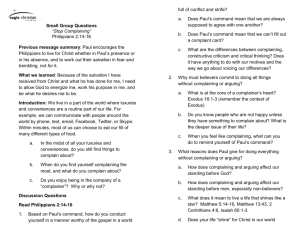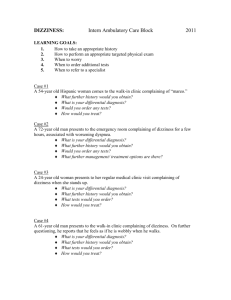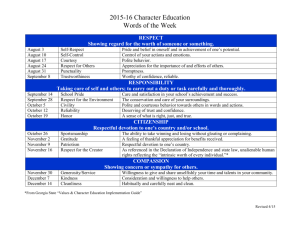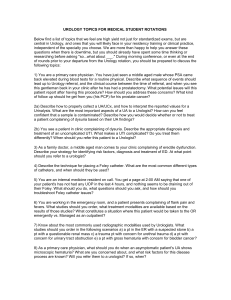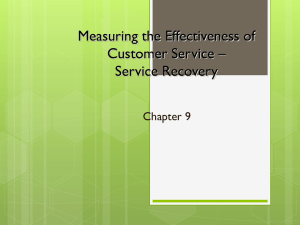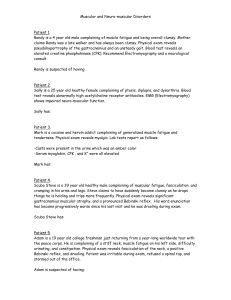For the Sin of Complaining
advertisement
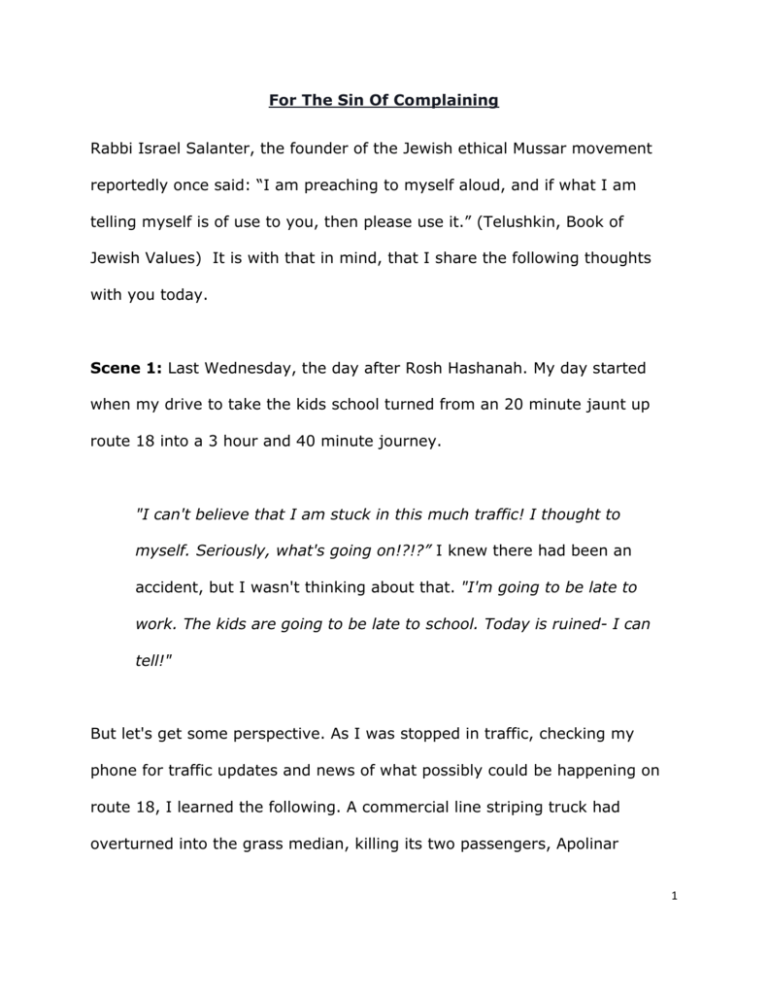
For The Sin Of Complaining Rabbi Israel Salanter, the founder of the Jewish ethical Mussar movement reportedly once said: “I am preaching to myself aloud, and if what I am telling myself is of use to you, then please use it.” (Telushkin, Book of Jewish Values) It is with that in mind, that I share the following thoughts with you today. Scene 1: Last Wednesday, the day after Rosh Hashanah. My day started when my drive to take the kids school turned from an 20 minute jaunt up route 18 into a 3 hour and 40 minute journey. "I can't believe that I am stuck in this much traffic! I thought to myself. Seriously, what's going on!?!?” I knew there had been an accident, but I wasn't thinking about that. "I'm going to be late to work. The kids are going to be late to school. Today is ruined- I can tell!" But let's get some perspective. As I was stopped in traffic, checking my phone for traffic updates and news of what possibly could be happening on route 18, I learned the following. A commercial line striping truck had overturned into the grass median, killing its two passengers, Apolinar 1 Guerrero, 39 and Juan Sanchez, 51, and critically injuring the driver, Nicolas Denis, age 23. Two people killed, the lives of their families shattered, a 23 year old critically injured, and I was complaining? For what? For rescue workers trying to do their job, while keeping everyone else safe? For having to spend three hours extra with my children, with nowhere to go and nothing to do, completely safe, and even with a full tank of gas. Scene 2: I am tired. I did not get to go for my morning run. In fact, I have not exercised in a week and I am getting cranky. I am easily agitated with my family, and I have too much to do. I can't believe I have to spend the day running errands all around town. I have to go to three stores to return stuff, then go to the grocery store, Costco, Target, and the post office. This really is ridiculous- I SO would much rather be sitting at home, watching TV, reading a book, or getting in that run that I have missed. Oh no- it's Mother's Day coming up and I have not gotten anything for Jane-Rachel yet. Another thing to do! I finally get all of my errands done. I am sitting in the Costco line waiting to get gas, and I open up Facebook on my phone to see what I have missed in the past few hours. And then I see it, a post, from a colleague and friend, Rabbi Ilana Garber, who is my age, a pulpit rabbi and a mother of two small 2 children, and was recently diagnosed with Lymphoma. She had been blogging about her experience, and this post was called "I told the boys." Ilana wrote, It was one of those parenting moments you dread, you plan for, you think about….and then without any plan, or thought, or even any dread, it just happens. ...I had thought it would all be presented in a nice package over the weekend. A kind of really messed-up Mother’s Day gift. Instead, they were both snuggled so close to me in bed this morning, each one a bit extra snuggly and loving. I put my arms around both and reminded them that “Ima’s body is still sick” from when I was in the hospital a few weeks ago. “We know,” they both said. Then, with a deep breath, but not much drama, I said simply, “Actually, Ima’s body needs some help getting better. So in a few days I’m going back to the hospital so the doctors can give me lots of medicine. I’ll stay in the hospital for a bit, then I’ll come home, and I’ll go back to the hospital a bunch – probably 6 more times. But I’ll always come home. And we can FaceTime and maybe you’ll even visit me there. I’ll probably be sick for a while, but you’ll have lots of fun people here to play with you…” And I went on about all of the relatives who are coming now and down the road, and how they’ll have such a fun summer playing etc. I told them that it’s called “cancer” but I could have said just about anything. And of course, I said very lightly, “the funniest thing is that Ima is going to have no hair soon! Do you think I’ll look like a boy?” That got some laughter from Big Boy. (http://ilanagarber.com/?p=502) And I was complaining? About having too many errands to run? About having to buy a Mother's Day present. Look what kind of Mother's Day she is having, I thought to myself. I am healthy, my family is healthy. What more do I want? 3 Scene 3: I am on vacation in Rehoboth Beach, Delaware. I finally get in that run (it was vacation after all). We get in line at this wonderful crepes place that we love. This is so annoying, the line is taking forever! We take our kids to rent bikes. They don't have enough bikes that are the right size. The kids are unhappy with the bike selection. This bike looks like it's for a girl- one says. This one is the wrong color- another says. Why don't they stock enough bikes- I complain to my Jane-Rachel. The place is so disorganized. This is ridiculous! A few hours later, after our crepes and our bike ride, and our waiting and complaining, we get back to our rental house and check email. Jane-Rachel receives a forwarded email, something you never want to receive. A woman she lived next door to in graduate school, a fellow Jewish professional, thirty-seven years old, mother of three young girls, was stopped at a stop sign on her morning drive to work and was hit from behind by a tractor trailer and killed. Just like that. Her young husband, a rabbi, and her little girls- left to pick up the pieces. The line is too long. I am frustrated that the kids are fighting over bikes? This is all so annoying. Really? For the great sin of "kvetching," (of complaining) Adonai, I ask your forgiveness. 4 It's all about perspective. It's all about where we place our focus each and every day. This morning, I want to encourage us to do better. It's not that we should never complain. It’s not that we don’t all, unfortunately, have moments of real pain, of real struggle, of real suffering. But most of the time, most of us, could, should, must try to stop complaining so much and so often. One of my favorite storytellers, Rabbi Ed Feinstein, shares the following story about the importance of perspective. Among the many Israelites who left Egypt were two men: Shlumiel and Buz. Slaves never look up; they only look down. And as slaves for their entire lives, Shlumiel and Buz had grown so accustomed to looking down they could no longer lift their eyes. When Moses brought us across the Red Sea, we all witnessed the great miracle: The sea parted, and we escaped from slavery. We became a free people. We came to know that God has a purpose in our history. Shlumiel asked Buz, “What do you see?” “I see mud,” Buz responded. “I see mud, too. What is all this about freedom? We had mud in Egypt; we have mud here!” And they missed the miracle of their escape. The sea split before them, but they didn’t see it. They saw only mud. Then we stood at Mount Sinai in the Presence of God and heard God’s voice proclaiming the commandments. We accepted God’s Covenant and pledged ourselves to become a holy people, God’s partners in healing the world. Shlumiel asked Buz, “What do you hear?” 5 “I hear someone shouting commands,” Buz answered. “I hear commands, too. What’s all this about Torah? They shouted commands in Egypt; they shout commands here.” And they missed the miracle of hearing God’s voice. God spoke to every Israelite, but Shlumiel and Buz didn’t hear His voice. They had heard enough commands. Finally, after forty years of wandering in the desert, we arrived at the Promised Land, the land of milk and honey, the land promised our ancestors. We arrived in the place of our fondest dreams. Buz asked Sh’lumi’el, “How do you feel?” “My feet hurt,” Shlumiel replied. “My feet hurt, too. What’s all this about a Promised Land? My feet hurt in Egypt; my feet hurt here!” And they missed the miracle of entering our own land, Eretz Yisrael. The Israelites returned to the land promised them by the Covenant. The promise to our ancestors was fulfilled. Shlumiel and Buz didn’t know it——they knew none of it. Their feet hurt too much. So what did they do? Shlumiel and Buz turned. around and began walking back toward Egypt. Some say that Shlumiel and Buz are still wandering in the wilderness, looking down at the desert sand and rocks and complaining to each other. Others say they went back to Egypt. Back to Pharaoh. Back to slavery. Back to the place they knew best. Back to the place where they began. Still others say they’ve seen Shlumiel and Buz—or perhaps their descendants—walking among us, living right here and now, wandering about with their eyes cast down, missing all the miracles that are taking place around them all the time. They haven’t any idea where they’re going. And they continue to miss all the many chances to know what life is about. If only they could lift up their eyes and see! (Feinstein, Capturing The Moon, Lift Up Your Eyes and See) Where do we look, when we are walking through our daily lives? Are we constantly looking for the mud? So many of us love to kvetch. Literally, to kvetch means to "pinch" or "squeeze" in Yiddish, though it is more 6 commonly translated as "to complain." Many of us in this room seem to enjoy kvetching, or at least we don't seem to know how to stop ourselves from kvetching on a regular basis. I am not talking about constructive or productive criticism here, something that is valued in our tradition, nor am I talking about complaining when we are in those moments of real struggle, of real pain, of real suffering. Rather, I am talking about the myriad of moments throughout the days, the weeks, the year when we squeeze the energy out of others, and out of ourselves, with our kvetching, our pinching, our complaining, about things that are by and large not all that important. To be fair, we come by this tradition of complaining honestly. As illustrated by the story of Shlumiel and Buz, our ancestors were expert kvetchers. The Israelites complained that Moses brought them out of Egypt to die in the dessert. They complained that there was no food. They complained that there was no water. From the very beginnings of our existence as a people, we have complained! How quickly our ancestors forgot all of the miracles that God provided for them by freeing them from Egyptian bondage in the first place. And we, their descendents, are not all that different. Many of us are quick to complain and slow to be grateful for the many miracles in our own lives. We fail to remember, or to truly appreciate the fact, that indeed, it could always be worse. 7 In truth, most of us are extremely blessed. Again, this is not to say that we don't face challenges, but I invite you to consider the following statistics for a moment: If you have never experienced war, imprisonment, torture, or famine, you are luckier than 500 million people in this world. If you are able to freely practice your religion without fear of harassment- you are freer than 3 billion people in this world. If there is food in your refrigerator, if you have shoes, a bed, and a roof above your head, you are better off than 75% of people in this world. If you can read, you do not belong to the 2 billion people who cannot. (adapted from Zion, A Night To Remember, 15) Those numbers are incredible. And even without official statistics, most of us who are blessed with so much in our lives are better off than we often realize. Yet still, when life gets frustrating- we quickly forget, and continue to complain. We know better. The heartbreaking stories that I shared before are, unfortunately, not unique. Many of have had real things to complain about throughout our lives. We have been through terrible experiences. We all have our own lists of more serious complaints and tragedies either in our own lives or separated by maybe just one or two degrees. We know the stories that remind us how life can be unspeakably cruel and God can be 8 utterly confusing and maddening. There is plenty of pain right here in this room- I imagine even at this very moment for some of you. And yet, those of us who are largely "okay" right now, or even feeling really good about our lives, can quickly find ourselves slipping, forgetting about the good and the blessing, and entering a mode of complaining about the minor inconveniences of our lives on a regular basis. Although most of us intellectually understand this, we all can use the reminder to get a little perspective on our kvetches. Yom Kippur is a perfect time for doing this. This is the time to purify ourselves of this habitual complaining. It is a reminder that life is too short, and our time is too precious to waste so much of it kvetching. God forbid, a traffic accident could strike at any moment. Terminal illnesses do not discriminate. A job loss or financial blow could render a family destitute. Who will live and who will die? we just read in the Unentaneh Tokef. Who will be at peace and who will be troubled? Who will be impoverished and who will be enriched? Okay- so how can we bring down the volume of our complaining? How can we start kvetching less and appreciating more? 9 1. We should remember that It could Always Be Worse Many of you probably know the story of the man whose house was so crowded, he sought the rabbi’s advice, and the rabbi kept telling him to bring his animals into the house one by one. First the rooster, then the chickens, the goats, and finally the cow. Finally, when the house was beyond busting at the seams, with all of the people and animals on top of each other, the exhausted and exasperated man returned to the rabbi. "Rabbi, this situation is terrible! Rabbi, please help me!" So, the rabbi instructed the man to take the animals out. And suddenly, the house that at one time seemed painfully crowded with his family, seemed spacious and comfortable. Again, it's all about perspective. Most of us have well more than we need in life- and we should remember that, it could always be worse. 2. Don't sweat the small stuff. As my own experiences illustrated, most of the things that we complain about are really “the small stuff.” Most things that we complain about are inconsequential. The next time you find yourself complaining- stop yourself if you can. Ask yourself- is this really worth complaining about? The Yom Kippur reminder that life is uncertain and it could always be worse should not be frightening, but rather liberating, because it frees us from working 10 ourselves up over all of those little things that are not really worth our precious time, emotional expense, or energy. 3. Shift your focus and strive to be more appreciative. Rabbi Lori Foreman writes: Complaining can sometimes become an automatic response. If things don't work out as we had hoped, we complain. However, such a response is never really constructive. It depletes our spirit. The next time you feel like complaining, consider turning the situation around. See if there is something for which to express thanks. Let us try to find ways to be grateful and ask for God's guidance to help us through those moments of trying and strive without complaining or losing our faith. (Restful Reflections, Rabbi Lori Foreman, 88-89) We are given a choice, almost daily, of whether to look at something to complain about, or be grateful for. And it usually depends on which way we are looking at it. Often, it simply takes a shift in perspective. So often the things bringing us down, prompting our complaining, are all a matter of perspective. We can always tell the same story, see the same glass, in at least two different ways – it is just up to each of us to decide where we want to focus our eyes. This year, let us strive to ask ourselves how we can strive to look for the positives amidst the frustrations. How can we learn to complain less and appreciate more? How can we learn to look for 11 the miracles and blessings, and not just the trials and tribulations of everyday life? 4. Finally, instead of complaining so much, focus on reaching out and helping others. Each of us should take the energy that we are expending by complaining, and channel it in a way that will be invigorating rather than depleting. When we complain, it is often more a reflection of our own state of being, than it is about that which we are seemingly complaining about. Why not work on healing that negative state of being through acts of altruism? We have all had the experience of helping others, and receiving a renewed sense of blessing and self-worth afterwards. The person that we visited who was sick, the child who we helped learn to read, the homeless person that we fed, or the soup kitchen at which we volunteered- these types of chesed, kindness and tikkun, healing are good for the world, but they are also good for our souls. We should complain less, and give more. Our spirits will feel lifted, and our souls will be grateful for the sense of peace and wholeness that comes with this kind of outlook on life. 12 I realize that what I am asking us to do seems simple enough. Minimizing our complaining, appreciating our blessings, looking at the glass half full are all lessons that most of us have been taught since we were very young. And yet. And yet, we complain, and we complain some more, and we get ourselves all tied in knots until we act miserably, spread negativity, and poison our own souls by having a negative attitude. Yom Kippur offers us a fresh start. The opportunity to wipe the complaining slate clean. The question is- will we be mindful enough to take advantage of it? Gmar Hatimah Tovah- May all of us be sealed in the Book of Life, filled with gratitude for the blessings of another year. 13
